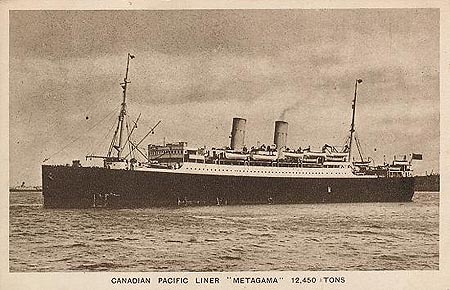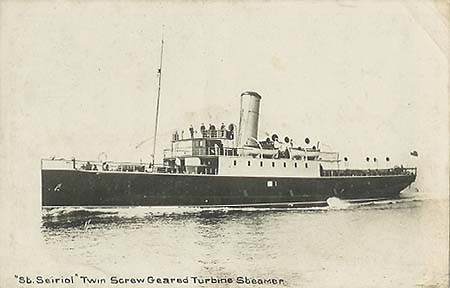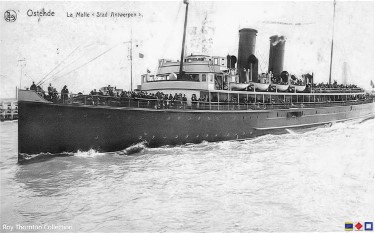|
Oct 7, 1873
|
Born in Essex, England to Arthur
and Maria Cowling
|
|
Nov 11, 1914
|
Attested into the 21st
Battalion in Kingston, Ontario
Ø Number 59208 (temporary number 993)
Ø Next of kin given as Annie Cowling, wife, Twickenham,
Middlesex, England
Ø Previous occupation given as Teamster
Ø No previous military experience given
Ø Religion given as Church of England
Ø Posted to “B” Company
o This was later reorganized into “A” Company
o Employed as a Waiter in the Sergeants Mess
The 21st Battalion trained
in the Kingston, Ontario area through the winter of 1914-15.
|
|
May 6, 1915
|
Embarked the RMS Metagama in
Montreal, Quebec

|
|
May 15, 1915
|
Disembarked in Devonport,
England and the battalion proceeded to the West Sandling Camp, near Hythe,
Kent to continue training
|
|
Jun 22, 1915
|
Returned to duty with “A”
Company from employment in the Sergeants Mess
|
|
Sep 14, 1915
|
Embarked the St. Seiriol in
Folkestone

|
|
Sep 15, 1915
|
Disembarked in Boulogne,
France and the battalion proceeded to St. Omer
|
|
Jan 24, 1916
|
Granted 9 days leave
|
|
Feb 3, 1916
|
Rejoined the battalion from
leave
|
|
Apr 8, 1916
|
While moving into the Reserve
Trench south west of Ypres, Belgium, Private Cowling sprained his right ankle
and was evacuated to the No. 4 CFA (Canadian Field Ambulance). He was transferred the same day, first to
the No. 10 CCS (Casualty Clearing Station) before being transported to the No.
3 Canadian General Hospital in Boulogne, France
|
|
May 2, 1916
|
Transferred to the No. 1
Convalescent Depot to continue his recovery
|
|
May 13, 1916
|
Discharged to the base details
in Boulogne
|
|
May 19, 1916
|
Reported to the base depot in
the Rouelles Camp, Havre
|
|
May 23, 1916
|
After leaving the base depot,
Private Cowling rejoined the 21st Battalion resting in the “B”
Camp near La Clytte, Belgium
|
|
May 26, 1916
|
Because his right ankle became
swollen and painful again, he was evacuated to the No. 4 Canadian Field
Ambulance for treatment and transported to the No. 5 Canadian Field Ambulance
|
|
May 30, 1916
|
Transferred to the Division
Rest Station
|
|
Jun 8, 1916
|
Discharged to duty from the
rest station
|
|
Jun 21, 1916
|
Admitted to the No. No. 5
Canadian Field Ambulance and transported to the No. 4 Canadian Field
Ambulance for treatment to his continuing problems with the sprained ankle
|
|
Jun 22, 1916
|
Admitted to the No. 25 General
Hospital in Hardelot, France with complications from his previously sprained
ankle
|
|
Jun 28, 1916
|
Transferred to the No. 1
Convalescent Depot in Boulogne
|
|
Jul 8, 1916
|
Transferred to the No. 5
Convalescent Depot in Boulogne
|
|
Jul 12, 1916
|
Transferred to the No. 1
Convalescent Depot
|
|
Jul 17, 1916
|
Transferred to the No. 7
Convalescent Depot
|
|
Aug 24, 1916
|
Transferred to the No. 3
Canadian General Hospital in Boulogne and PUO (Pyrexia of Unknown Origin), a
fever, was added to the diagnosis
|
|
Sep 4, 1916
|
Transferred to the No. 7
Convalescent Depot and the diagnosis was changed to read Acute Bronchitis
|
|
Sep 6, 1916
|
Transferred to the No. 3 Rest
Camp
|
|
Sep 14, 1916
|
His medical category was
changed to PB (Permanent Base) and invalided to England
Transferred to the CCAC
(Canadian Casualty Assembly Centre) before being transferred to the Canadian
Training Division in Shorncliffe
|
|
Sep 18, 1916
|
Attached to the 39th
Reserve Battalion in West Sandling for light duties
|
|
Dec 1, 1916
|
Ceased to be attached to the
39th Reserve Battalion and attached to the GDD (Garrison Duty
Depot) for light duties
|
|
Jan 27, 1917
|
Attached to the 18th
Reserve Battalion for light duties
|
|
Feb 27, 1917
|
Sentenced to 7 days Field
Punishment No. 2 for being drunk
|
|
Mar 10, 1917
|
Transferred to the EORD
(Eastern Ontario Regimental Depot)
|
|
Apr 25, 1917
|
Transferred to the BCRD
(British Columbia Regimental Depot) in Dibgate
|
|
May 27, 1917
|
Transferred to the YMCA (Young
Mens Christian Association) for light duties in France
|
|
May 29, 1917
|
Transferred to the Canadian
Composite Company for pay purposes while attached to the YMCA
|
|
May 31, 1917
|
Transferred to the 21st
Battalion for pay purposes, and remained attached to the Canadian Corps
Composite Company for duty with the YMCA
|
|
Feb 19, 1918
|
Transferred to the Canadian
Labour Pool
|
|
Feb 26, 1918
|
Attached to the “B” Dump, 1st
Army for rations
|
|
Mar 27, 1918
|
Ceased to be attached to the
“B” Dump, 1st Army for rations
|
|
Apr 29, 1918
|
Admitted to the No. 7 Casualty
Clearing Station with a diagnosis that reads Bronchitis
|
|
May 2, 1918
|
Transferred via the No. 1 AT
(Ambulance Train) and admitted to the No. 56 General Hospital in Etaples
|
|
May 4, 1918
|
Invalided to England aboard
the Hospital Ship Stad Antwerpen

On arrival in England he was
admitted to the Colchester Military Hospital where the diagnosis reads
Bronchitis and Trench Fever. While at
this hospital, he had surgery to remove a rectal abscess.
Transferred to the General
Depot for pay purposes while in hospital
|
|
May 23, 1918
|
Transferred to the Granville
Canadian Special Hospital
|
|
Jul 15, 1918
|
Granted sick leave until July
25, 1918.
On completion of his leave he
was instructed to report to the 1st Canadian Convalescent Depot
for Physical Training
|
|
Aug 2, 1918
|
Admitted to the Ravenscroft
Hospital for dental treatment
|
|
Aug 23, 1918
|
Transferred to the 1st
Canadian Convalescent Depot
|
|
Sep 2, 1918
|
Ceased to be attached to the
convalescent depot while a patient of the Ravenscroft Hospital
|
|
Sep 3, 1918
|
Transferred to the Princess
Patricia Canadian Red Cross Hospital in the Cooden Camp, Bexhill
|
|
Feb 19, 1919
|
Discharged from hospital and
transferred to the 6th Reserve Battalion in Seaford
|
|
Apr 17, 1919
|
Transferred to Military
District No. 10, Kinmel Park, Rhyl pending discharge
|
|
May 6, 1919
|
Transferred to the 6th
Reserve Battalion and attached to the 2nd CDD (Canadian Discharge
Depot) in London, pending discharge in the British Isles.
|
|
Jun 3, 1919
|
Discharged from the CEF in
London, England
Ø Rank on discharge
Private
Ø Proposed residence
on discharge 20 Albert Rd., Twickenham, England
Following his discharge, the
1914-15 Star, British War Medal, and Victory Medals were sent to him at 20 Albert
Rd., Twickenham, England
|
|
Jul 27, 1940
|
Basil Cowling died of
Pulmonary Tuberculosis and Chronic Bronchitis at St. Albans, Hertfordshire,
England. His death was determined to
be as a result of his service at the front in WW1.
At the time of his death, his
next of kin was recorded as Mrs. Grace Winifred Dolling, daughter, 27 Folly
Avenue, St. Albans, Herts, England
|
|